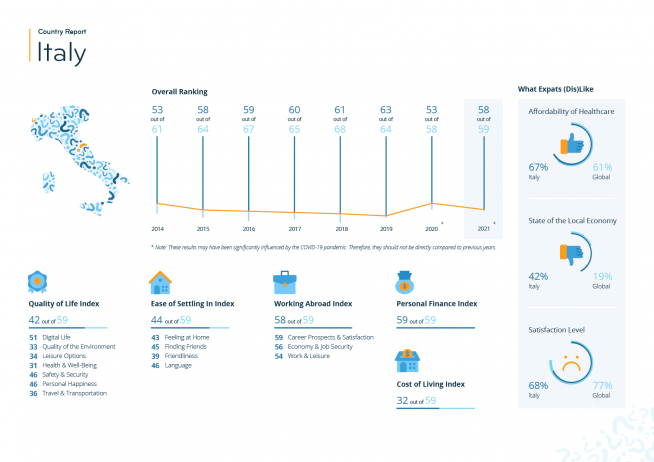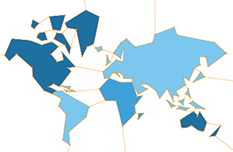Italy: The Second-Worst Destination for Expats
Top Findings
- Italy is the second-worst country for expats — ranking only ahead of Kuwait (59th).
- 56% of expats rate the local career opportunities negatively (vs. 33% globally).
- Nearly twice the global average rate the political stability negatively (31% vs. 16% globally).
- Over seven in ten expats (71%) are happy with the climate and weather (vs. 66% globally).
- Just 35% have an income of more than 50,000 USD per year (vs. 49% globally).
Expats Struggle with Their Finances
Coming in 58th place in the Expat Insider 2021 survey, Italy is the second-worst country for expats — ranking only ahead of Kuwait (59th). In the Personal Finance Index (59th), the Southern European country even lands in last place worldwide: 30% of expats are dissatisfied with their financial situation (vs. 19% globally), 14% even very much so, twice as much as the global average (7%). Furthermore, one in three expats (33%) says their disposable household income is not enough to cover their expenses (vs. 23% globally). A US American expat says: “I notice financial corruption and do not like the low salaries.” In fact, 42% of expats in Italy have an income of less than 25,000 USD per year, compared to 30% globally. Just 35% have an income of more than 50,000 USD per year (vs. 49% globally).
Unattractive Job Market
Italy also performs poorly in the Working Abroad Index (58th), only ahead of Turkey (59th), coming last in the Career Prospects & Satisfaction subcategory (59th). More than half the expats (56%) rate the local career opportunities negatively (vs. 33% globally), and close to a third (31%) are dissatisfied with their job (vs. 16% globally). An Iranian expat shares: “Finding a job is not easy for foreigners, not even for the well-educated ones.” Moreover, 36% are unhappy with their job security (vs. 20% globally), and 42% rate the state of the local economy negatively — more than twice the global average (19%).
Finding a job is not easy for foreigners.
Another 27% complain about their working hours (vs. 16% globally), and 25% are unhappy with their work-life balance (vs. 17% globally). “Job opportunities are hard to get, and the working hours are not flexible,” says a Pakistani expat. In Italy, the largest share of expats works in the field of education (16% vs. 12% globally), followed by language and translation (7% vs. 2% globally).
Lagging Behind for Digital Life
Italy comes in 42nd place in the Quality of Life Index, with its worst results in the Digital Life subcategory (51st): 23% of expats find it difficult to get high-speed internet access at home, compared to just 12% globally. Another 18% find it difficult to pay without cash (vs. 9% globally), and 40% are unhappy with the availability of government services online (vs. 21% globally). An expat from the United States shares: “Nothing is easy here, from internet access to setting up accounts. Additionally, there is too much politics and there are too many formalities.”
Nothing is easy here, from internet access to setting up accounts.
Italy comes 46th in the Safety & Security subcategory, with more than three in ten expats (31%) rating its political stability negatively (vs. 16% globally). The country is also one of the worst destinations when it comes to Personal Happiness (53rd): only 66% of respondents say they are happy with their life in general — which is almost ten percentage points below the global average (75%).
Overall, there are few upsides about expat life in Italy, such as the climate and weather (71% happy vs. 66% globally) and the travel opportunities (88% vs. 84% globally).
The Impact of COVID-19 on Expat Life
In Italy, more than one in four expats (26%) get their information on COVID-19 and related regulations from their friends or neighbors (vs. 19% globally). Most respondents, however, stay up to date through the local news (54% vs. 47% globally), official government channels (46% vs. 48% globally), and social media (39% vs. 40% globally). Less than two-thirds of expats in Italy (65%) are satisfied with the official communication regarding COVID-19, about the same as the global average (66%). The majority of expats that are unhappy with the information (70%) find the official communication unclear, confusing, or contradictory (vs. 67% globally).




